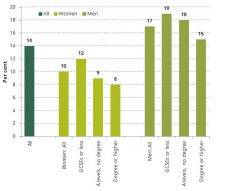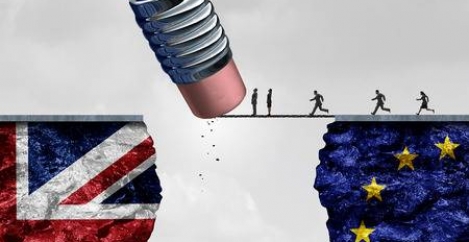October 8, 2018
Unskilled and low skilled men most at risk from Brexit
 Men with GCSE qualifications or below employed in certain manual occupations are more likely than other groups to work in industries at particular risk from new barriers to trade with the EU after Brexit. Historically, those in this group have struggled to find equally well-paid work elsewhere when job losses have occurred. That is one of the key conclusions from detailed new analysis of trade data carried out by researchers at IFS and funded by the ESRC’s UK in a Changing Europe initiative.
Men with GCSE qualifications or below employed in certain manual occupations are more likely than other groups to work in industries at particular risk from new barriers to trade with the EU after Brexit. Historically, those in this group have struggled to find equally well-paid work elsewhere when job losses have occurred. That is one of the key conclusions from detailed new analysis of trade data carried out by researchers at IFS and funded by the ESRC’s UK in a Changing Europe initiative.
The EU is the UK’s largest trading partner. It is the most important destination for UK exports and the most important source of imports to the UK. In new analysis, researchers at IFS have investigated which industries, regions and types of workers would be most and least affected by increased barriers to trade with the EU under different Brexit scenarios. The scenarios consider both potential new tariffs and higher non-tariff barriers (such as customs checks). Below are some of the main conclusions from our analysis.
Impacts will vary across industries
Clothing manufacture, transport equipment (including car manufacturing) and the chemicals and pharmaceuticals sector are at particular risk from higher trade barriers. These industries sell a large fraction of their output to the EU. The transport equipment sector is particularly exposed because the EU is also the source of a quarter of its inputs; with increased trade barriers, the cost of its inputs from the EU would rise and demand for its outputs in the EU would fall.
Finance is the most exposed services industry, as it currently exports a relatively large share of its output (12%) to the EU. Crucial here will be the scale of non-tariff barriers, including the potential loss of passporting rights, after Brexit.
Industries such as agriculture may benefit from trade barriers if consumers substitute away from more expensive imports from the EU towards products made in the UK. However, the industries that could benefit make up only a small share of employment and the overall economy. These benefits would also come at the expense of consumers facing higher prices.
Workers in affected industries are more likely to be male and to have low formal qualifications
 Overall, 14% of workers (or 3.7 million) are employed in industries that we classify as very highly exposed – that is, they work in industries that we estimate would lose more than 5% of their value added if trade with the EU was on WTO rules.
Overall, 14% of workers (or 3.7 million) are employed in industries that we classify as very highly exposed – that is, they work in industries that we estimate would lose more than 5% of their value added if trade with the EU was on WTO rules.
Nearly 20% of men with low levels of formal qualifications work in industries that are very highly exposed to increased trade barriers with the EU. That compares with 15% of highly educated men and less than 10% of highly educated women.
Men with fewer educational qualifications in Northern Ireland and the West Midlands may be particularly exposed. While about a fifth of low-educated men work in industries we class as highly exposed in the UK as a whole, this rises to a quarter in Northern Ireland and the West Midlands.
Workers in process, plant and machine operative occupations are particularly exposed. Around 29% of the workers in this occupation group – roughly half a million people – are employed in very highly exposed industries. This should be a matter of particular concern for policymakers. Workers in this occupation group tend to be older and are more likely to have skills that are specific to their current roles and industries of employment. As a result, they may find it particularly difficult to move to as well-paid employment in less adversely affected industries.
On average, those with higher earnings are more likely to work in more exposed industries than those with lower earnings Many of the lowest-earning workers are employed in service industries such as the care sector, hospitality and retail that tend to export less to the EU. Higher-paid jobs in manufacturing and finance are more exposed.
Agnes Norris Keiller, a co-author of the report and a Research Economist at IFS, said: “If barriers to trade with the EU increase, particularly the sort of ‘non-tariff’ barriers created by customs checks and regulatory divergence, then some sectors of the economy will be affected more than others. Parts of the manufacturing sector are likely to be hardest hit. As a result, the jobs or wages of men with low formal qualifications working in certain manual occupations may be under particular threat. These are the sorts of workers who are most likely to find it hard to adapt and to find new roles that are equally well paid elsewhere.
“Conversely, the UK agriculture industry could gain from trade barriers as households switch from demanding EU food products to ones made in the UK. But these gains would be at the expense of UK consumers, and these industries are a small proportion of overall employment.”













